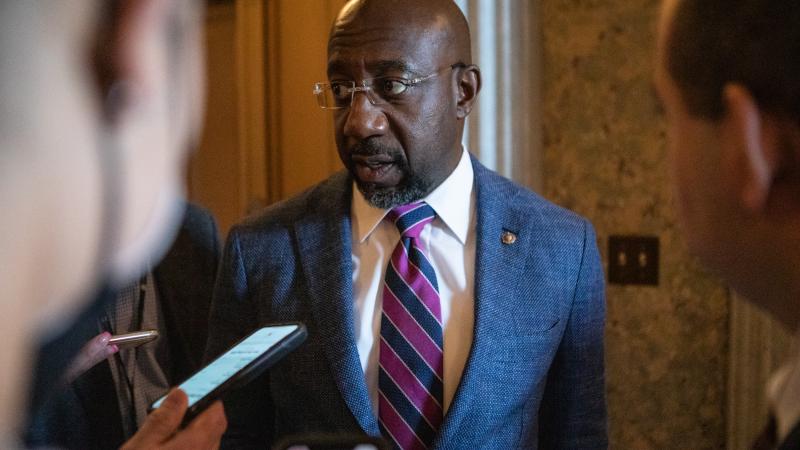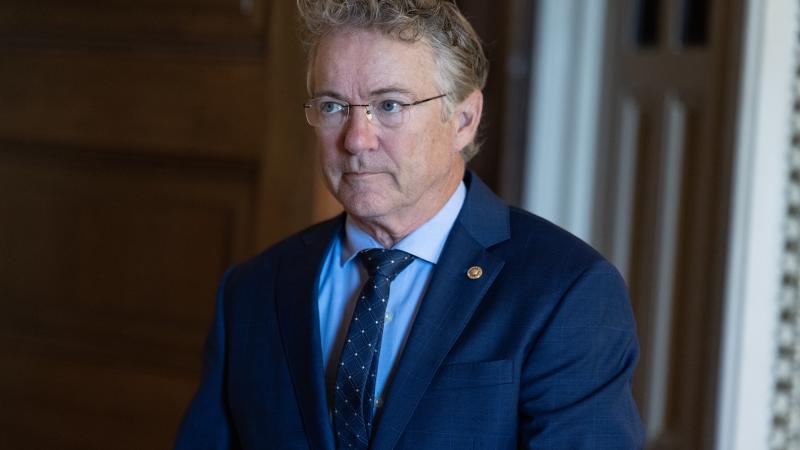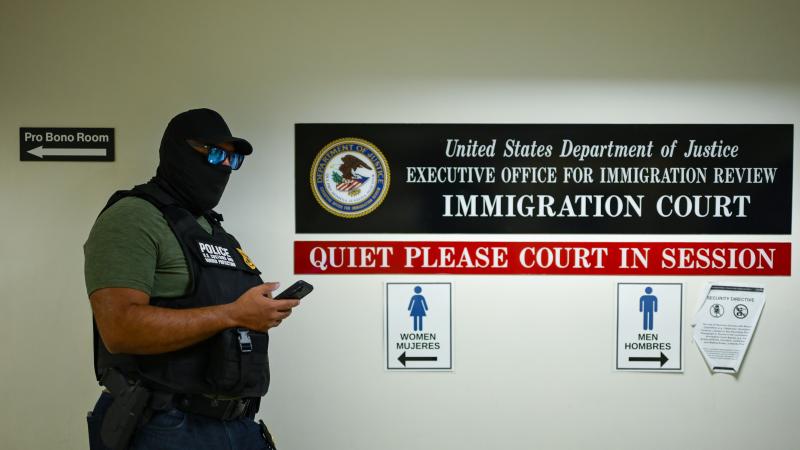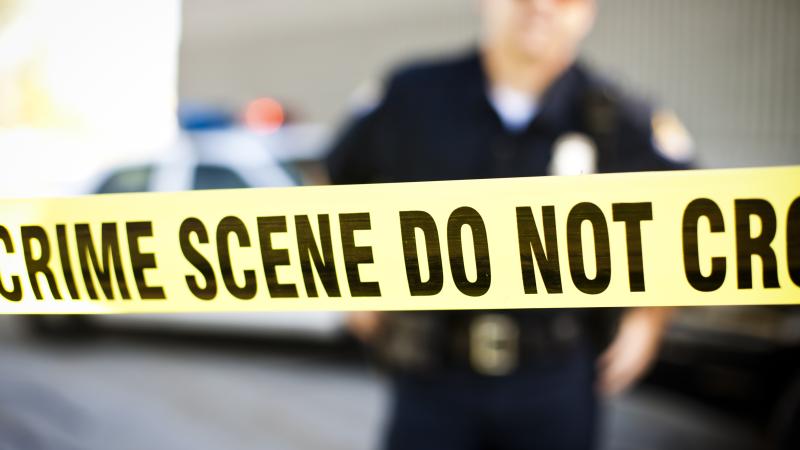Congress collected 30 million lines of phone data in Trump J6 probe, raising civil liberty concerns
More details continue to emerge about the collusion between Democrats in Congress and Biden's weaponized DOJ in targeting Trump.
Congressional investigators collected a stunning 30 million lines of phone data mapping contacts between conservatives and the Trump White House in the name of investigating the Jan. 6 Capitol breach, a massive dragnet that raises civil liberty concerns about the lack of limits on the ability of lawmakers to snoop on Americans' private phone calls.
The mountainous collection of phone records were revealed to the FBI led by Chris Wray in late 2023 by former Rep. Adam Kinzinger, a GOP member on the Democrat-run House Jan. 6 select committee. The cache was offered to the bureau on the eve of the 2024 presidential election as evidence without requiring a warrant, according to an FBI document memorializing the offer that was reviewed by Just the News.
The memo says Kinzinger told the FBI that the phone data had been collected by then-former Rep. Denver Riggleman, an ex-Republican who was a staffer on the Capitol riot committee and who later helped Hunter Biden’s legal team in its efforts to cast doubt on the laptop belonging to Joe Biden’s son.
Congressional powers used to conduct lawfare against Trump
The FBI memo does not reveal whether the bureau ever took Kinzinger up on his offer, but it does reveal the sheer magnitude of a phone surveillance project the Democrats ran by using congressional subpoenas to gather phone records about Americans' contacts with the Trump White House.
Kinzinger told the FBI that the J6 committee “collected and linked a substantial amount of telephone data, and noted the FBI may already possess such data. While former congressman Denver Riggleman worked with the Select Committee he (Riggleman) had a contact and was able to obtain toll information including for White House root or switchboard numbers via congressional subpoena,” the FBI agents wrote in their memo summarizing the offer.
“Kinzinger noted that he (Kinzinger) did not conduct the analysis himself but that Riggleman had identified certain telephone connections between numbers identified as being associated with the White House and certain individuals,” the memo continued.
In a post Wednesday on his substack, Kinzinger confirmed he had the conversation with the FBI in December 2023 alerting agents to the data but said he believed the collection of phone records was old news because the congressional subpoenas were public.
"Congress used lawful subpoenas to obtain phone metadata in 2021. It was routine. It was reported. It was discussed openly," Kinzinger wrote. "In 2023, I had a brief discussion with members of the FBI reminding them of this data if they needed it in their investigation. Regardless, they didn’t seem interested and that was that."
While the Jan. 6 committee's subpoenas records were public, the size and scope of the data was not mentioned in those subpoenas nor was the contact with the FBI. Previously, an investigator for the committee estimated in a book that the data was 18 million lines of data. Kinzinger offered a much larger size of the data in his FBI interview at 30 million lines of data.
GOP Senators, Congressmen and other leaders targeted
It was revealed last week that Special Counsel Jack Smith and the Biden-era FBI collected the private phone records of eight Republican senators and one GOP House member as part of his investigation into the Capitol riot of Jan. 6, 2021.
The FBI’s Arctic Frost investigation also targeted dozens of GOP officials and organizations, according to documents released by Republican Senate Judiciary Committee Chairman Chuck Grassley in September.
The newly-released memo on Kinzinger and Riggleman was recently uncovered by current FBI Director Kash Patel and has garnered significant attention inside the bureau because of the timing of the contact between the agents and the former lawmaker in December 2023.
By that time, Kinzinger had already left Congress and the committee he worked for had ended its probe a year earlier. But the 2024 presidential election between Donald Trump and Joe Biden was heating up with the first presidential primaries just weeks away from starting.
Agents noted that Kinzinger seemed eager to help the FBI at that moment and that Congress had not figured out what to do with the massive collection of data.
“Kinzinger indicated that Riggleman may have never received direction on what to do with the toll data, which included approximately 30 million lines of data,” the FBI memo stated. “Kinzinger believed it was in an electronic format but did not know if it was the original subpoena returns."
The agent who interviewed him said “that she would contact Kinzinger if any additional information was requested,” the memo stated.
Kinzinger did not immediately respond to a request for comment sent to him through the speaker’s bureau contact listed on his personal website. Riggleman did not immediately respond to a request for comment sent to him through his LinkedIn page.
Latest revelation raises concerns about Biden-era dragnet
Mike Davis, a former top lawyer for the Senate Judiciary Committee and the founder of the Article 3 Project, told Just The News that the revelations in the FBI memo could prompt legal challenges that may rein in congressional oversight powers.
“This episode will test the limits of the congressional immunity afforded by the Constitution’s Speech and Debate Clause and whether that affords protection to activity that constitutes a criminal conspiracy to violate Americans’ civil rights,” he said.
Mike Howell, the president of the conservative Oversight Project, told Just the News that “the January 6th Committee was an absolute violation of civil rights that far exceeded anything it ever purported to be investigating” and that “they abused their authority to engage in a political mapping exercise to surveil their political opponents.”
He added that “whoever turned this information over to the Committee is exposed here, and we will be exploring ways to hold them accountable.”
Grassley’s office said Tuesday that he had sent letters to four telecom companies: Verizon, AT&T, T-Mobile, and Lumen “requesting they provide to Congress all records that were handed over to former Special Counsel Jack Smith as part of his elector case against President Trump.”
The Republican chairman told the telecom providers that “no court order or provision of law can prevent you from notifying Senators of any legal process that sought disclosure of any Senate data transmitted on Senate or dual use devices related to Senators’ offices” and that there was “a reasonable concern that calls, texts, and emails sent from or to those devices may have been acts consistent with the duties of office.”
Grassley also sent letters to the Department of Homeland Security, the Department of Defense, the Office of the Director of National Intelligence, the National Archives and Records Administration, and the U.S. Attorney’s Office for the District of Columbia to ask what information they had provided to Smith.
January 6 Committee and FBI’s Arctic Frost conduct sweeping investigation into Trump World
An unearthed FBI record from 2023 indicated that investigators at the bureau had “conducted preliminary toll analysis on limited toll records” tied to phone calls related to GOP Sens. Johnson, Lindsey Graham, R-S.C.; Bill Hagerty, R-Tenn.; Josh Hawley, R-Mo.; Dan Sullivan, R-Alaska; Tommy Tuberville, R-Ala.; Cynthia Lummis, R-Wyo.; Marsha Blackburn, R-Tenn.; and GOP Rep. Mike Kelly, R-Pa.
“Deranged Jack Smith got caught with his hand in the cookie jar. A real sleazebag!!!” Trump said on Truth Social last week in response to the news.
Patel: "Baseless monitoring of members of Congress" under Biden
“This document shows the Biden FBI spied on 8 of my Republican Senate colleagues during its Arctic Frost investigation into ‘election conspiracy’ Arctic Frost later became Jack Smith's elector case against Trump,” Grassley said in a Monday afternoon tweet as he shared the FBI record that had been provided to him by Patel. “BIDEN FBI WEAPONIZATION = WORSE THAN WATERGATE.”
The once-secret FBI record, dated late September 2023, has the title of "CAST Assistance" — a likely reference to the bureau’s cellular analysis survey team. The case ID for the record is "ARCTIC FROST — Election Law Matters — SENSITIVE INVESTIGATIVE MATTER — CAST."
“As a result of our latest disclosure about the baseless monitoring of members of Congress by the prior leadership team of the FBI, we have already taken the following actions: We terminated employees, we abolished the weaponized CR-15 squad, and we initiated an ongoing investigation with more accountability measures ahead,” Patel tweeted on Tuesday.
Grassley's office said last week that "the FBI in 2023 sought and obtained data about the senators’ phone use" from January 4, 2021 through January 7, 2021 (the day after the Capitol riot). The senator's office said that "that data shows when and to whom a call is made, as well as the duration and general location data of the call" although not the contents of the calls themselves.
The Senate chairman's office revealed that the FBI document "was found in a Prohibited Access file in response to Grassley’s oversight requests."
The revelation that the FBI snooped on the phone records of Republican members of Congress during its January 6 investigation is bringing greater scrutiny on Wray, during whose tenure the bureau's effort occurred, and to Smith, who was leading the Biden Justice Department’s investigation against Trump.
These revelations are also putting the spotlight on former key FBI official Timothy Thibault, whom Republicans argue showed extreme anti-Trump bias, demonstrated a willingness to target Trump early in his first term, attempted to slow walk or block the FBI’s investigation into Hunter Biden, and in April 2022 helped spark the investigation dubbed "Arctic Frost" — later carried on by Smith — which led to criminal charges against Trump related to the Capitol riot.
FBI's "targets" listed in document
Trump and other Republicans repeatedly alleged that Smith and the FBI were themselves engaging in election influence by trying to bring charges, hold trials, and obtain convictions against Trump ahead of the 2024 election.
An FBI document from the Arctic Frost inquiry dated January 2023 showed that the investigation’s “targets” included Donald J. Trump for President Inc., Turning Point USA, the Republican Attorneys General Association, the America First Policy Institute, the Save America PAC, the Conservative Partnership Institute, and more.
“In total, 92 Republican targets, including Republican groups and Republican-linked individuals, were placed under the investigative scope of Arctic Frost. On that political list was one of Charlie Kirk’s groups, Turning Point USA,” Grassley said last month.
“In other words," Grassley added, "Arctic Frost wasn’t just a case to politically investigate Trump. It was the vehicle by which partisan FBI agents and DOJ prosecutors could achieve their partisan ends and improperly investigate the entire Republican political apparatus.”
Kinzinger’s late 2023 approach to the FBI about the data which Riggleman had collected occurred a few months after the date of the FBI’s congressional snooping document.
Howell told Just the News that “the fact that a completely unhinged Denver Riggleman was running point on this tells you all you need to know” and that “even the Democrats thought he was too crazy."
Riggleman’s role in helping the Biden DOJ target Trump World
Riggleman responded to last week’s revelation that Smith had obtained the phone records of Republican members of the House and Senate by hinting that he had helped make that happen.
“If people need to know about the difference in metadata & tapping phones, give me a call,” Riggleman tweeted in response to the news last week. “Also, I know the limitations the FBI most likely imposed — because the J6 committee tech team ‘very much’ assisted in crafting the subpoenas for J6 call records. There’s a book about it.”
Riggleman wrote a book titled The Breach: The Untold Story of the Investigation into January 6th which was published in September 2022 — prior to Kinzinger’s approach to the FBI.
The book detailed Riggleman’s descriptions of the Jan. 6 committee’s sweeping data collection efforts.
“Part of the work I oversaw on the committee was the painstaking process of matching phone numbers to names, utilizing powerful law enforcement databases and other clues as we could find them,” Riggleman wrote. “My files included information on thousands of sensitive texts, language for subpoenas and preservation requests, as well as technical plans and documents related to advanced analysis.”
Riggleman wrote that “our team analyzed phone numbers that belonged to those in the Trump family, rallygoers, rally planners, influencers like [Mike] Flynn, [Roger] Stone, and [Steve] Bannon; and many others.”
“In going through CDRs [call detail records] received via subpoena for DOJ-charged defendants, planners, and senior influencers, we had already spotted several phones that connected with White House phone numbers,” the book said. “This included some numbers known to the public, such as the general White House switchboard line. Others were not readily obtainable. We found those through leveraging sources and our own deep dives into the data.”
Riggleman wrote that “my team dubbed these area code and exchange combinations that were associated with the White House ‘root numbers’” and that “after I got a look at Trump’s logs, we began scanning all our CDRs for these White House landline and cell phone numbers.”
The book said that “I recommended that the committee visually map out the connections among these groups and the escalation of their rhetoric in simple charts for the public. Once the investigation proceeded and my team had its hands on the evidence, those maps would prove more shocking than I had imagined.”
“We could validate what had just been guesses. Our analysis identified targets — or, excuse me, persons of interest — that the committee had no idea about,” Riggleman claimed in the book. “We identified and validated addresses for subpoenas and hidden phone numbers. We built dossiers for the investigative team with robust profiles of these individuals.”
Riggleman and the Hunter Biden legal team
After his time on the Jan. 6 committee, it was revealed in July 2023 that Riggleman was helping Hunter Biden’s legal team undercut investigations into Joe Biden’s son.
"Denver has been assisting us with data analysis since late last year," Hunter Biden lawyer and friend Kevin Morris told CBS News at the time. "He is an invaluable resource and we have made tremendous strides in untangling the massive amount of corruption and disinformation involved in this story. There will be much more coming to the public."
Riggleman told the media at the time that "I and my forensics, data, and telephony team are conducting data investigations and analysis for Hunter Biden's legal team" and that he was focusing on "data across the spectrum."
The outlet said Riggleman had reportedly spent months “providing digital forensic analysis for the Biden legal team on whether any data linked to Hunter Biden, such as text messages, has been distorted or fabricated.”
Riggleman told then-CNN host Jim Acosta that month that his role with the Hunter Biden team “is really the same as it was with the committee — was really technical and analytical support based on computer forensics and phone forensics” and that “I've been tracking data and what everybody has been saying over the past two years."
“I also found out, as the Hunter Biden legal team reached out to me, that a lot of the people who have been pushing this are the same people who pushed the J6 conspiracy theories,” Riggleman claimed.
Helped push "Russian disinformation" hoax about Hunter's laptop
Riggleman joined a September 2024 episode of the Mission Implausible podcast hosted by Hunter Biden laptop letter signers John Sipher and Jerry O’Shea.
The infamous Oct. 2020 laptop letter helped contribute to the baseless narrative that the Hunter Biden laptop stories were nothing but a product of Russian disinformation — a narrative seized upon by Joe Biden’s 2020 campaign and spread by some of the laptop letter signers.
Although the laptop letter hedged a bit at various times, it did repeatedly contend there was Russian involvement with the laptop stories, arguing that “if we are right, this is Russia trying to influence how Americans vote in this election” and expressing “our view that the Russians are involved in the Hunter Biden email issue.”
The letter claimed that the laptop saga “has all the classic earmarks of a Russian information operation” and that “our experience makes us deeply suspicious that the Russian government played a significant role in this case.”
Riggleman told the podcast hosts last year that “the 51 signers of the letter will probably be smiling a little bit about validation” and that “I think when people attack I don’t think they understand what Russian amplification or influence looks like, but you guys do.”
The Jan. 6 committee staffer and Hunter Biden legal team's helper said that “I would be offensive” not “defensive” about defending signing the Hunter Biden laptop letter.
IRS whistleblowers previously revealed that the FBI verified the authenticity of Hunter Biden’s laptop in late 2019 — nearly a year before the New York Post's stories and the laptop letter. It would be another eighteen months — and after the election — that The New York Times and Washington Post accepted that the laptop truly was Biden's.
Riggleman said on the podcast that he had joined the team helping Joe Biden’s son in 2022, claiming that Hunter Biden’s attorneys took a private flight to Virginia to convince Riggleman to help them. He said he then went on a Zoom call with Hunter Biden and his wife, who asked, “Will you please help us.” At the end of the call, Riggleman says he told them, “I will help.”
The former Republican claimed that the Hunter Biden laptop stories were based on “fabricated data,” “manipulated data,” and “out of context data” — though he did not provide proof.
Sipher wrote an article for The Bulwark in March where he sought to defend his decision to sign the Hunter Biden laptop letter, and he cited Riggleman by claiming that “the unusual circumstances of the story, along with the murky chain of custody — former congressman and Air Force officer Denver Riggleman, as a member of Hunter Biden’s legal team, reviewed the entirety of the data and found it forensically unsound, most likely containing a mix of information from multiple drives and devices — only heightened our concerns.”
The laptop letter signer also said in June on the Jack Hopkins Show that “some of the people that I've gotten to meet since I've retired and become friends with in the political space, who I really am impressed by, are women like Abigail Spanberger, who's running for governor here in Virginia.”
Hopkins told Sipher that “you're somebody I know I would enjoy having a beer with.”
“Well, that's what we need to do,” Sipher said. “We need to go to Denver Riggleman's place and get free bourbon from him. I think he owes that to us. Yes, and I think I can get one of the Vindmans there, and maybe I can get Abigail Spanberger.”
Sipher cut ads for Spanberger in 2018 and 2020 as she ran for Congress, and he is supporting the Democrat’s current bid to be Virginia governor. Spanberger has also featured Riggleman in recent campaign ads.
The Facts Inside Our Reporter's Notebook
Links
- collected
- targeted
- said
- Verizon
- AT&T
- T-Mobile
- Lumen
- told
- Department of Homeland Security
- Department of Defense
- Office of the Director of National Intelligence
- National Archives and Records Administration
- U.S. Attorneyâs Office for the District of Columbia
- unearthed FBI record
- said
- said
- reference
- tweeted
- said
- said
- revealed
- revelation
- greater scrutiny
- putting the spotlight
- anti-Trump bias
- willingness
- slow walk
- helped spark
- alleged
- document
- said
- tweeted
- wrote
- revealed
- told
- told
- said
- told
- podcast
- John Sipher
- Jerry OâShea
- seized upon by Joe Bidenâs 2020 campaign
- spread by some of the laptop letter signers.
- letter
- told
- said
- the FBI verified the authenticity of Hunter Bidenâs laptop
- said
- claimed
- wrote
- said
- Abigail Spanberger
- campaign ads














